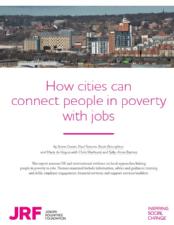IER News & blogs
Forthcoming seminar 'Prolonging working life through ICT: the role of crowdsourcing'
IER is hosting an EPSRC funded Balance Network seminar on'Prolonging working life through ICT: the role of crowdsourcing'. The one day seminar will explore how crowdsourcing has changed the boundary between work and home, enabling older people to remain part of the labour force and perhaps achieve a new work-life balance. The interactive seminar will be held on 3 March at the University of Warwick. Click here to register your interest.
seminar on'Prolonging working life through ICT: the role of crowdsourcing'. The one day seminar will explore how crowdsourcing has changed the boundary between work and home, enabling older people to remain part of the labour force and perhaps achieve a new work-life balance. The interactive seminar will be held on 3 March at the University of Warwick. Click here to register your interest.
Key professions losing staff due to lack of support for student mothers
 Key professions such as nursing, teaching and social work are losing thousands of potential recruits as student mothers drop out of higher education due to a lack of support from universities. New research led by IER's Dr Clare Lyonette is published today. The research, funded by the Nuffield Foundation, highlights the true scale of the pressures placed upon mothers who go to university and calls for more to be done to assist them. Read more about the project and download the reports here.
Key professions such as nursing, teaching and social work are losing thousands of potential recruits as student mothers drop out of higher education due to a lack of support from universities. New research led by IER's Dr Clare Lyonette is published today. The research, funded by the Nuffield Foundation, highlights the true scale of the pressures placed upon mothers who go to university and calls for more to be done to assist them. Read more about the project and download the reports here.
Professor Kate Purcell talks about the life and work of Rosemary Crompton
Podcast from the Inaugural Rosemary Crompton Memorial Lecture 2015 held at City University, London. Professor Kate Purcell talked about the life and work of Professor Rosemary Crompton and Professor Crompton's contribution to our understanding of work, employment, social class and gender. Watch the podcast here.
Professor Rosemary Crompton was a pioneering sociologist. Her insights into class and gender inequalities produced a large body of work which continue to have resonance today. After Rosemary's premature death in 2011 the Academic community sought to perpetuate her memory by holding an Annual Rosemary Crompton memorial lecture. The lecture series is to be organised around the key themes of her work: gender, class and employment. The inaugural speaker was Professor Erik Olin Wright, University of Wisconsin-Madison, an international expert in class inequalities and a former colleague of Professor Crompton.
New report on How cities can connect people in poverty with jobs
 This study, by Professor Anne Green with others from IER and in partnership with Dr Paul Sissons and Kevin Broughton (Coventry University), reviews UK and international evidence on local approaches linking people not in work to jobs, and those in work to better jobs. It looks at four stages in a stylised ‘pathway to employment’: pre-employment; employment entry; staying in work; and in-work progression. It found that variations in the challenges and opportunities facing cities have an impact on how anti-poverty policies are likely to succeed. Although there are differences in cities’ precise powers and resources, their policies can reduce poverty in their area. However, the evidence is clear that progress can be made without greater local autonomy and with no or limited additional resources. Among other factors in the success of anti-poverty strategies are how strong the local leadership is and what priority is given to change in local areas.
This study, by Professor Anne Green with others from IER and in partnership with Dr Paul Sissons and Kevin Broughton (Coventry University), reviews UK and international evidence on local approaches linking people not in work to jobs, and those in work to better jobs. It looks at four stages in a stylised ‘pathway to employment’: pre-employment; employment entry; staying in work; and in-work progression. It found that variations in the challenges and opportunities facing cities have an impact on how anti-poverty policies are likely to succeed. Although there are differences in cities’ precise powers and resources, their policies can reduce poverty in their area. However, the evidence is clear that progress can be made without greater local autonomy and with no or limited additional resources. Among other factors in the success of anti-poverty strategies are how strong the local leadership is and what priority is given to change in local areas.
For more information see:
Green, A.E., Sissons, P., Broughton, K., and de Hoyos, M. with Warhurst, C. and Barnes, S-A. (2015). How cities can connect people in poverty with jobs. York: Joseph Rowntree Foundation. (A Summary is also available)
Looking Back, Looking Forward: What's Happened to Work and Employment?
As part of the Social Sciences Festival celebrating the University of Warwick 's 50th Anniversary, the University's network on Connecting Research on Employment and Work (CREW) will be holding an event on 8th May, 11 am - 3 pm, to be held at the University's Ramphal building.
This event will identify key changes in work and employment that have taken place over the years since the University of Warwick was established in 1965. In the morning session senior scholars will review some of the continuities and changes (and how we think about them) in their fields of study. After a complimentary lunch, there will be presentations by newer members of the faculty looking ahead to future trends and practices.
Colleagues from trades unions, enterprise or training councils and other academic organisations are welcome to attend and further details of the event can be found here: http://www2.warwick.ac.uk/fac/soc/festival2015/eventprogramme/friday8thmay/looking_back_v3.pdf
